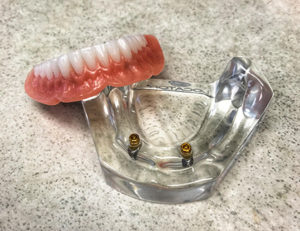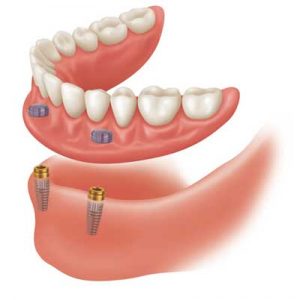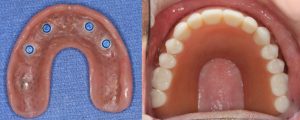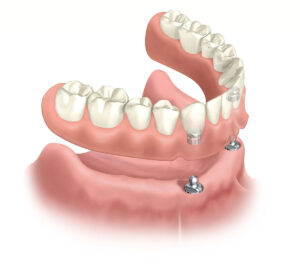Dentures are nothing new. In fact, around 90 percent of elderly Americans wear some form of dentures, so they’re definitely more of an “in” thing than you might have thought. If you’re concerned about the appearance or fit of your dentures, learn what to do about unsatisfactory denture appearance here.
Patients have several treatment options for tooth replacement, and understanding these options is important for making informed decisions about their oral health care.
There are many types of dentures on the market, but one that’s growing in popularity are snap-in dentures. Many users say that they’re easier to work with and fit their lifestyle. However, before you order a set for yourself, you need to be made aware of some common problems with snap-in dentures, so patients can understand how these issues might affect their treatment options.
Introduction to Snap-In Dentures
Snap-in dentures, also known as implant-supported dentures, represent a modern approach to dental restoration for individuals with missing teeth. Unlike traditional dentures, which rest on the gums and often require adhesives to stay in place, snap-in dentures are anchored securely to dental implants that are surgically placed in the jawbone. This connection provides a stable and natural-feeling solution, allowing for improved comfort and confidence when eating, speaking, and smiling.
With the guidance of a dental professional, snap-in dentures can help restore oral health and function, offering a reliable alternative to conventional dentures for those seeking a long-lasting and effective treatment for tooth loss.
Denture Types and Options
When considering dentures, it’s important to understand the different types available and how they can impact your oral health and daily comfort. Traditional removable dentures are the most common option, but they can sometimes shift in the mouth and cause discomfort, especially during eating or speaking.
Fixed dentures, which are permanently attached to the jawbone using implants, offer improved stability and a more secure fit. Snap-in dentures combine the best of both worlds by using implants for enhanced comfort and stability, while still being removable for easy cleaning. Each type of denture has its own advantages and considerations, so it’s essential to consult with a dental professional to determine which option best suits your needs and lifestyle.
Problems With Snap-In Dentures
What exactly could go wrong with these types of dentures? Problems with snap-in dentures can arise at various stages of the procedure, from implant placement to daily use. This article goes into detail with a few of the problems you might expect. Keep reading to find out more!
The Denture Is More Fragile
One of the first things to know is that snap-in dentures tend to be more fragile than their conventional counterparts.
Snap-on dentures are created with quality materials, but their design is made finer and a bit more delicate at the implant section than the chunkier traditional dentures. If the snap-in denture becomes damaged or loose, it can result in dentures shifting in the mouth, which affects comfort and function.
This means that snap-ons are more susceptible to breaking where the implant is located. You’ll want to make sure you take care of the dentures as you use them for your daily activities.
If the snap on denture breaks, it will usually happen at the site of the implant. Don’t worry though, our dentists are trained to repair all denture problems, usually in office. So if your denture cracks, then call us right away and we can have it fixed in about an hour.
You’ll Need to Brush the Implants to Prevent Problems
Cleaning your dentures is an important part of maximizing their longevity and protecting your health. Snap-in dentures should be removed and cleaned daily to prevent staining, plaque buildup, and oral irritation. However, this is especially important when it comes to snap-on dentures.
The implants used in snap-on dentures can house unwanted plaque and calculus over time, allowing unhealthy bacteria to grow in their crevices if left unattended. You’ll want to make sure you clean your dentures as often as you would actual teeth (at least twice a day) to keep germs at bay.
Also be sure to brush the implants in your mouth with a soft toothbrush. Brushing can be accomplished in under 10 seconds per implant.
And make sure to visit your dentist once a year to have them evaluate your prosthetics. Wearing dentures overnight without proper cleaning can increase the risk of oral health problems.
The Snaps Wear Out Over Time
Snap-on dentures are designed to fit your mouth to precision. However, sometimes even the best jobs can wear out over time.
Your denture parts will become loose and wear down as time goes on. The blue colored plastic inserts take the brunt of the chewing forces and therefore become squished over time. The plastic parts simply wears out. These need to be replaced every 6-12 months depending on the case.
In and of itself, this isn’t much of a problem provided you have your dentist handle it early on. However, long-term looseness could lead to damaged gums and implant problems.
Luckily, replacements are simple and inexpensive. Make sure to see a professional dentist to have your implant parts replaced every six to 12 months or as the dentures loosen.
Other upper denture problems include:
- denture cracking
- teeth popping off
- breaking in half
- gum soreness
At Rockville Dental Arts, we are highly trained to fix all the above problems in our office in a fast and efficient manner. We will get your denture fixed and back to chewing normal foods in no time!
Causes of Denture Problems
Denture problems can develop for a variety of reasons, and understanding these causes can help you prevent issues before they start. Poor oral health and gum disease are common culprits that can affect the fit and comfort of both traditional and snap-in dentures. Snap-in dentures tend to be more delicate than traditional dentures, making them more susceptible to denture cracks and wear out over time, especially at the snap attachments.
If the snaps become worn or the denture is not properly maintained, you may experience shifting, discomfort, or even denture rubs and mouth sores. Regular check-ups with a dental professional are key to catching these problems early and ensuring your dentures remain comfortable and functional.
Oral Health Considerations
Taking care of your oral health is essential when wearing snap-in dentures. To keep your denture teeth and gums healthy, gently brush them daily with a soft toothbrush, paying special attention to the implants and snap attachments. This helps prevent plaque buildup and reduces the risk of gum soreness, difficulty chewing, or even implant failure.
Regular check-ups with your dental professional are also important for monitoring the condition of your dentures and implants, as well as addressing any issues like discomfort or changes in fit. By prioritizing daily care and professional guidance, you can enjoy the benefits of snap-in dentures while minimizing potential risks to your dental health.
The Importance of Regular Check-Ups
Scheduling regular check-ups with your dental professional is crucial for maintaining the health and longevity of your snap-in dentures. During these visits, your dentist will examine the condition of your dentures, implants, and surrounding tissues, making any necessary adjustments or repairs to prevent common problems such as denture cracks, snaps wearing out, or gum disease.
Regular check-ups also provide an opportunity to catch underlying oral health issues, like gum disease or tooth decay, before they impact the success of your dental restoration. By staying proactive with your dental care, you can ensure your snap-in dentures continue to offer comfort, stability, and a natural appearance for years to come.
Additional Problems That Arise
Bone resorption is a common concern associated with snap-on dentures, also known as implant-supported dentures.
Having enough bone in the jaw is essential for the successful placement of snap-in dentures, as the dental implant needs adequate support. If there isn’t sufficient bone, bone grafts may be required to build up the jawbone before implants can be placed.
When natural teeth are lost, the underlying jawbone can begin to deteriorate due to the absence of tooth roots. This process, known as bone resorption, can continue even with traditional dentures. However, snap-on dentures help mitigate this issue by providing stimulation to the jawbone through a dental implant, which acts as an artificial tooth root.
The healing process after dental implant placement is important, as it takes several months for the jawbone to integrate with the dental implant before the denture can be fitted.
The implants act as artificial tooth roots, transmitting forces to the bone and helping to maintain its density and shape. While bone resorption may still occur over time, the use of implant-supported dentures can significantly slow down the rate of deterioration, preserving the jawbone structure and supporting long-term denture stability.
Regular check-ups with a dentist are crucial to monitor the condition of the bone and ensure appropriate adjustments or interventions are made if necessary.
Remember These Problems With Snap-In Dentures
Snap-in dentures may be a popular choice for many, but you’ll certainly want to stay aware of the problems with snap-in dentures before you buy dentures of your own. Your best bet is to have a professional help you find the right dentures for your needs — and we can help you do that.
Rockville Dental Arts is dedicated to helping those in Maryland and surrounding regions get back their best smile. We work on many types of dentures, including professionally installed snap-in dentures, fixed dentures, and partial dentures, as well as dental implants and other dental services.
The cost of snap-in dentures can vary depending on the initial cost, any additional procedures such as tooth extractions, and your insurance coverage. Surgery is required to place the implants that support snap-in dentures, and our team will guide you through the entire surgical process, including recovery. Snap-in dentures can also make it easier to enjoy certain foods that may be difficult to eat with traditional dentures. We offer a free consultation to discuss your treatment options, costs, and answer any questions you may have about the procedure.
Are you ready to get a new pair of pearly whites?
Take a look around our site to learn more about all of the services we have to offer, and make sure to book an appointment when you’re ready. We can’t wait to see you smile!




